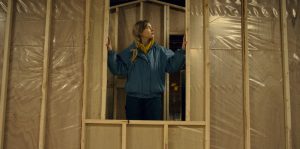
Mobile Homes explores how a young mother and son survive from bouncing around from motel to motel, unexpectedly landing in a transportable mobile home they would ultimately like to call home. The film stars Imogen Poots (Frank & Lola) as Ali as she is forced to choose between the unpredictable ways of her toxic boyfriend Evan played by Callum Turner (The Only Living Boy in New York) and the duties of being a responsible mother to her 8-year-old son Bone played by Frank Oulton in a multitude of environments. Mobile Homes is written and directed by Vladimir de Fontenay (Memoria). The film is the winner of the 2017 Audience Award at the Athens International Film Festival and also premiered in the Directors’ Fortnight Program at the 2017 Cannes Film Festival.

“…getting this young mother to really only become a mother for her son when she lost everything…and is willing to have him grow up away from her.”
The mother/son dynamics have been explored in other films but none to the extent of being homeless, desiring a safe haven to call home, and the impact of unhealthy environments to a kid, all while looking for the next place to sleep. The director divulged, “In a situation where a mother and her son couldn’t have a home, were dreaming of a home, what it meant for them dreaming of normality, and doing everything they can to find a roof over their heads. Only when the roof collapses, they realized that the meaning of home is something way deeper than a roof and it’s something that they have between them. It’s very metaphorical for a sense of longing for a home and what it means to have a home as a young adult. The thread in the writing was getting this young mother to really only become a mother for her son when she lost everything, put him in grave danger, and is willing to have him grow up away from her. It’s so taboo in society for a young mother to not be ready to be a mother and abandon her child or children. It was taking this character to that extreme where she truly only becomes the mother at the very end of the film.”
The connection and chemistry between the mother and son had to align so that the tension in the performances felt raw and true. “I had the intuition that we needed to do casting with kids that had never acted before. We went to a bunch of farms, met all these kids, and wanted for that kid to feel very comfortable with adults, but also with animals and have an inner life. That would help a lot with his performance in the context of the film because the kid is so often confronted with adults’ problems but also left alone in hotel rooms. We created a safe space and made him feel very free before the shoot. What really drew me to Imogen was she is lively, so fun, and goofy at times. She really brought it to the character, especially in the second half of the film. She’s also just very natural and able to react in the moment in situations. In terms of them acting together, the movie is very much the story of a relationship forming between her and her son. They didn’t know each other at all when we started shooting, they were like foreign to each other. It’s really hard for an 8-year old kid to be like this person that you’ve never seen before is your mother. What’s really helping us is that they’re not mother and son at the beginning of the movie, they’re companions. They have a journey that they’re forced to live together, but they’re not mother and son. They really become mother and son throughout the film as their relationship evolved, really getting to know each other. It was much easier for them to share tenderness and be close to each other as a real mother and a real son would be. In a way the shooting was made, we tried to shoot in chronological order as much as possible, which really helped their performance too,” explained de Fontenay.
“They really become mother and son throughout the film as their relationship evolved…”
Throughout the film, there is a real-life chicken that establishes a role as a symbolic representation. “There are these roosters that are fighting death. A big contrast occurs with how Evan is growing these animals to kill each other compared to the little chicken that Bone cares for and wants to grow to be a happy animal. In a way, it’s very metaphorical how Bone was taking care of and treated throughout the film. Also, the idea of innocence that exists in the kid and is reflected in the animals. The characters are really facing the true consequences of their action by looking at how they hurt that innocent thing. In Mobile Homes, the characters see the true color of the consequences of their actions,” concluded the director.
Vladimir de Fontenay’s film unveils the symbolic connection between a mother and her son’s relationship as they search for a true place to call home. Mobile Homes is available On Demand/Digital HD on January 22, 2019.
